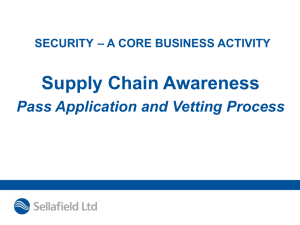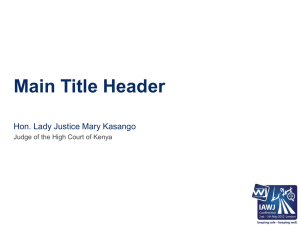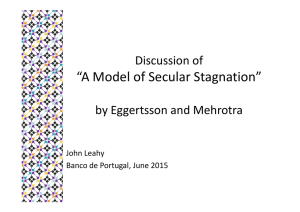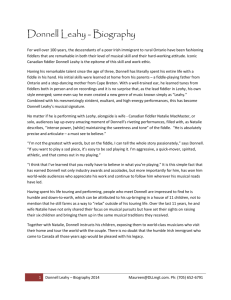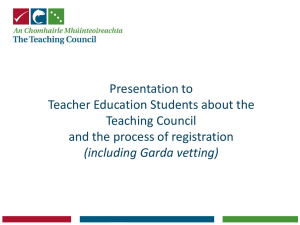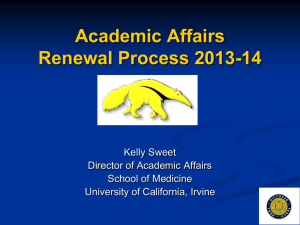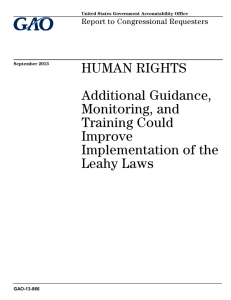the presentation here
advertisement
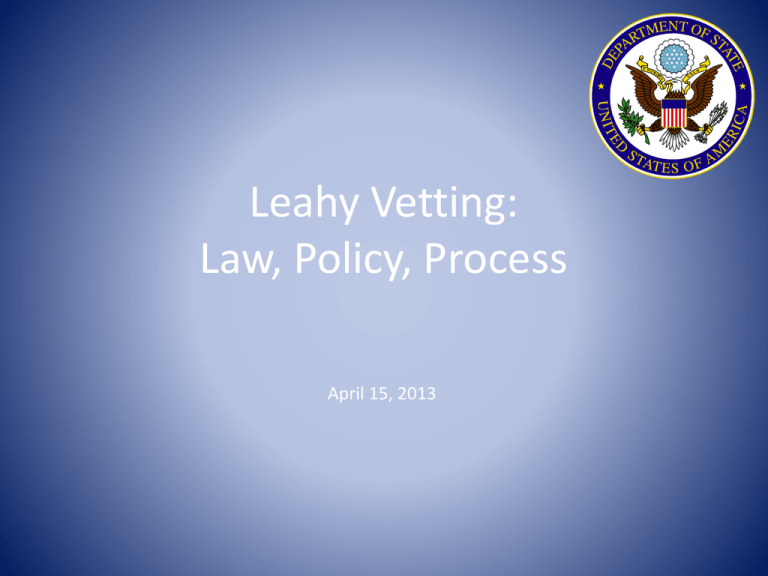
Leahy Vetting: Law, Policy, Process April 15, 2013 Leahy Law (State) “No assistance shall be furnished … to any unit of the security forces of a foreign country if the Secretary of State has credible information that such unit has committed a gross violation of human rights.” - Section 620 M of the Foreign Assistance Act of 1961, as amended (FAA) Leahy Law (Defense) “None of the funds made available by this Act may be used to support any training program involving a unit of the security forces of a foreign country if the Secretary of Defense has received credible information from the Department of State that the unit has committed a gross violation of human rights, unless all necessary corrective steps have been taken.” - DOD Appropriations Act for FY2012 (Div. A, P.L. 112-74), Sec. 8058 Leahy Law Recent Changes Foreign Assistance Act of 1961, as amended: Section 620M “Limitation on Assistance to Security Forces” “(a) IN GENERAL. – No assistance shall be furnished under this Act or the Arms Export Control Act to any unit of the security forces of a foreign country if the Secretary of State has credible information that such unit has committed a gross violation of human rights. (b) EXCEPTION. –The prohibition in subsection (a) shall not apply if the Secretary determines and reports to the Committee on Foreign Relations of the Senate, the Committee on Foreign Affairs of the House of Representatives, and the Committees on Appropriations that the government of such country is taking effective steps to bring responsible members to justice. (c) DUTY TO INFORM. – In the event that funds are withheld from any unit pursuant to this section, the Secretary of State shall promptly inform the foreign government of the basis for such action and shall, to the maximum extent practicable, assist the foreign government in taking effective measures to bring the responsible members of the security forces to justice. Leahy Law Recent Changes Cont’d (d) CREDIBLE INFORMATION. – The Secretary shall establish, and periodically update, procedures to(1) ensure that for each country the Department of State has a current list of all security forces units receiving United States training , equipment, or other types of assistance; (2) facilitate the receipt by Department of State and United States embassies of information from individuals and organizations outside the United States Government about gross violations of human rights by security force units; (3) routinely request and obtain such information from the Department of Defense, the Central Intelligence Agency, and other United States Government sources; (4) ensure that such information is evaluated and preserved; (5) ensure that when vetting an individual for eligibility to receive United States training the individual’s unit is also vetted; (6) seek to identify the unit involved when credible information of a gross violation exists but the identity of the unit is lacking; and (7) make publically available, to the maximum extent practicable, the identity of those units for which no assistance shall be furnished pursuant to subsection (a). What is Credible Information? Leg history: evidence need not be admissible in a court of law. Should be deserving of confidence as a basis for decisionmaking NGO information or press reports can be sufficient (assuming sources have reputation for accurate and impartial reporting and reported information has indicia of reliability) Information ideally should be corroborated by multiple sources (i.e., more than one source preferred although not necessary; depends on quality of source/information) Gross Violations of Human Rights Not defined in the Leahy context According to section 502B(d) of the FAA, gross violations of internationally recognized human rights includes: torture or cruel, inhuman, or degrading treatment or punishment, prolonged detention without charges and trial, causing the disappearance of persons by the abduction and clandestine detention of those persons, and other flagrant denial of the right to life, liberty, or the security of person (e.g. extrajudicial killing). Department Leahy Vetting policy also includes: – Politically-motivated rape This is not an exhaustive list. Incidents are examined on a case-by-case basis. What is a unit? The legislative history indicates that “unit” may be “construed as the smallest operational group in the field . . . Implicated in the reported violation.” Primary example: Battalion or its equivalent May be unique to the country, security force, and unit type Clean and tainted units may be part of the same larger unit. Rehabilitating Security Forces • For a tainted unit or member to become eligible for training again, the Leahy Amendment requires: State DoD Secretary of State determines and reports to All necessary corrective steps Congress that the government of such country have been taken is taking effective steps to bring the responsible members of the security forces unit to justice Implementation through INVEST system • Human rights vetting or Leahy vetting for training events begins in the home country of a security force unit or individual member • Program coordinator gets list of units/individuals to be provided assistance and submits to the U.S. embassy in-country • U.S. embassy enters names into the International Vetting and Security Tracking System (INVEST), conducts checks, and submits results to Washington Vetting in Washington • DC Leahy vetters receive candidates for training from U.S. embassies in INVEST once post vetting is complete • DC vetters in the U.S. post’s regional geographic bureau and in DRL check additional sources • Once DC vetting is complete, the home country embassy is notified of results via INVEST • No assistance may be provided without Leahy vetting authorization from State via INVEST Fast Track • Countries that are functional democracies with no significant human rights concerns may be considered for Leahy Fast Track status. Vetting for such countries is done at post and not in Washington.
